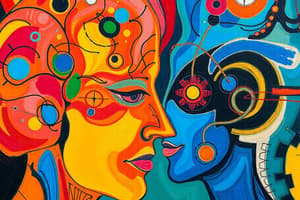Podcast
Questions and Answers
What is referred to as the 'hard problem' of consciousness?
What is referred to as the 'hard problem' of consciousness?
- Identifying specific functions of neurons.
- Determining the structure of the brain.
- Explaining the subjective experience from neural activity. (correct)
- Understanding how different brain areas communicate.
Which of the following best defines consciousness according to the provided content?
Which of the following best defines consciousness according to the provided content?
- An observable behavior related to stimuli.
- An unconscious reaction to environmental factors.
- Subjective or phenomenal experience. (correct)
- A collection of neural networks.
What analogy is used to describe the mind in the content?
What analogy is used to describe the mind in the content?
- A computer processor.
- A navigational system.
- A private theater. (correct)
- A library of experiences.
What are 'qualia' as described in the content?
What are 'qualia' as described in the content?
Why is consciousness considered a challenging problem in both philosophy and science?
Why is consciousness considered a challenging problem in both philosophy and science?
What philosophical question is raised to illustrate the complexity of consciousness?
What philosophical question is raised to illustrate the complexity of consciousness?
What misconception about consciousness is commonly found?
What misconception about consciousness is commonly found?
Which statement reflects a view on the contents of consciousness?
Which statement reflects a view on the contents of consciousness?
Flashcards are hidden until you start studying
Study Notes
The "Hard Problem"
- Consciousness is the most baffling and complex aspect of human existence.
- It is the most direct and obvious thing to investigate, yet proves nearly impossible to study objectively.
- Consciousness is considered the most challenging problem in philosophy and science today.
- The question “what is it like to be a bat?” exemplifies the challenge of understanding consciousness.
Defining Consciousness
- There is no universally accepted definition of consciousness.
- If a creature possesses subjective experiences, implying a sense of “what it’s like to be,” then it is considered conscious.
- Subjectivity or phenomenality refers to the nature of our conscious experience—the way things seem to us.
- Qualia are the subjective qualities of experience, like the redness of red or the smell of turpentine, which cannot be fully explained objectively.
- The fundamental question of how subjective experiences arise from the physical activity of the brain is known as “the hard problem” of consciousness.
The Theatre of the Mind
- A common metaphor compares the mind to a private theater inside our head, where we sit observing the world through our senses.
- The “contents of our consciousness” are the thoughts, images, and sensations projected onto the stage of this mental theater.
- This theater houses a multi-sensory experience from touch, smell, and emotions.
- The "self" in this mental theater is the lone audience member experiencing these thoughts and impressions.
- This image of the mind as a theater, though helpful, struggles to reconcile with the complex, interconnected network of neurons that comprise the brain.
Studying That Suits You
Use AI to generate personalized quizzes and flashcards to suit your learning preferences.





